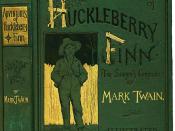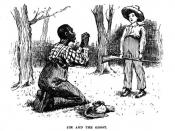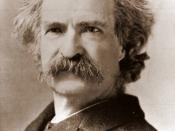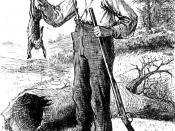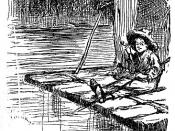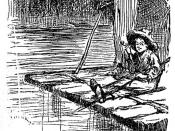In the Adventures of Huckleberry Finn, Mark Twain satirizes the hypocritical and ridiculous characteristics of society. He uses four characters to create a comparison between society's viewpoint and the ethical viewpoint. Huck and Jim represent the castaways of society while their opposites characterize society's stereotypes.
Literature usually depicts slaves as uncivilized, brutal, ruthless, and worthless creatures. Twain, however, diverts from that belief and glorifies Jim, the slave, bringing down Pap, the white man, through their juxtaposition. Pap symbolizes cruelty and ruthlessness through his abusive tirades while Jim symbolizes the compassionate father figure that Pap should be. White men, like Pap, consider blacks to be the most uncivilized and incompetent people, when it is really those same white men who are what they proclaim others to be. For example, when Pap first sees Huck he states "You've put on considerable frillsâ¦" (14), referring to Huck's new clothes and education. Pap attacks Huck for having "considerable frills" (14), being a civilized, well-dressed, and educated young man.
It's ironic that Pap holds Huck's education and looks against him; a father should be proud of his son, but Pap's cursing just establishes him as a heartless man who views his son as a means of acquiring money for alcohol. Through detail Twain showcases Pap's uncivilized characteristics, which include beating and abusing Huck or cursing government. He reveals Pap in detail to satirize the stereotypical white man who cannot change his beliefs. Pap symbolizes a white man with every opportunity to better his life but one who refuses it repeatedly; instead gets drunk and beats his son. He represents the worst of society as the embodiment of the typical white man who is brutal, hateful, and racist. Twain furthers his criticism of slavery through Jim's character. Where Pap's character is horrendous, Jim is absolutely wonderful. Although Jim is black he cares for Huck as much as he cares about his own children. For example, the reader can finally see Jim's love for Huck when the fog separates them. When Jim realizes that Huck played a trick on him he hysterically cries, "En when I wake up en fine you back agin', all safe en soun', de tears come en I could a got down on my knees en kiss you' foot I's so thankful" (65). Through this event the reader understands that Jim truly cares for Huck because he shows so much joy and happiness when he sees him (unlike Pap who starts to criticize Huck at first sight). Furthermore, through his love Jim is also viewed as a human being with emotions, unlike the uncivilized Neanderthals that white men see. Jim really has no bad bone in his body; considering that Huck is a little boy yet he readily believes his lie, he would also sacrifice himself for Huck if needed. Twain portrays Jim as a person who continually strives to protect Huck, always willing to suffer himself. Twain satirizes the concept that a slave is merely an animal, not capable of human abilities. Jim is shown as very emotional, caring as well as intelligent, not an animal. Furthermore, Twain uses satire to reveal the prejudiced conditions of blacks. When the King and duke sold out Jim, Jim was locked in a shed. However, even though he is locked up and chained by the Phelps family they do not administer the most punishment on Jim. It is really Tom who does, forcing Jim to comply with his demands in order for Tom to amuse himself. Tom needlessly risks Jim's life, especially since he already knows that Jim is free. Yet when Tom is shot in the leg Jim risks his own freedom to help Tom, even though Tom was so cruel to him. Twain again portrays Jim as a genuinely caring and honest person who is completely opposite of the typical perception of the black man.
Mark Twain also juxtaposes Tom Sawyer and Huck to show the difference between Tom and an illiterate and an "uncivilized" person. Tom represents the educated well off man who is blinded by tales of romantic literature. He loves adventure and will go out of his way to make even the simplest tasks into a great journey. His desire to complicate everything is purely based on fantasy. Twain expresses is disdain at society's reverence to romantic literature through his humorous example of Tom's little society. Tom discovers the word "ransomed" in some novel and insists that the gang do this although he does not know the definition of the word. His gang represents the sheep that follow and a just because everyone else believes to be true, in this case the word. During the meeting of the robbers Mark Twain satirizes society of that time. Tom gives a bunch of rules for their "gang", such stealing cattle and houses is "burglary" but noâ¦they want to commit robbery, kill men but no women, and rob on any day but Sunday. Twain mocks the hypocrisy of that society because Tom gets all of his ideas and rules out of fictional books as does society. Tom exaggerates everything while Huck sees no point in what Tom does. Tom is full of emotion and adventures whereas Huck is practical and logical. He sees the world realistically and logically and his ideas enable him to survive but Tom believes that the world is like a great big story. Tom cannot live the life he imagines because he is not willing to leave the comfort of society thus he follows rules dictated by society. Huck, on the other hand, removes him from the ridiculous society and escapes. In his escape, every detail is carefully planned out, from the pigs blood to his hair, Huck shows himself as a very intelligent boy. His escape may lack all of the fancy details yet he has a sound and foolproof method of escaping, unlike Tom's excessive plans which only complicate matters. Huck also matures and grows throughout his journey on the river. He learns to respect Jim as another human being and as an equal and so he really wants Jim to escape. Tom, however, only helps Jim escape to have an adventure, not noticing the pain and suffering he forces Jim to live. Basically Tom symbolizes the society that Huck views as impractical and too full of absurd ideas and one that he wishes to leave behind.
In the Adventures of Huckleberry Finn, Mark Twain satirizes the hypocritical and ridiculous characteristics of society. He used four different characters to create a comparison between society's viewpoint and the ethical viewpoint. Huck and Jim represent the castaways of society while their opposites characterize society's stereotypes.
In this novel as Huck journeys on the river he discovers many of society's problems that Mark Twain addresses through his satire and humor poking fun at society's ridiculous ideals. Twain uses Huck to put forth the mind of an individual troubled about conforming to society's expectations or trusting his own mind. Huck portrays a human being who makes mistakes but learns, a human being similar to the reader. So even though he may lack the perfect qualities of a hero the reader learns with him and empathizes with him on some levels. That is Twain's purpose: to use the trials of a little boy who attempts to listen to his conscience to show how we, humans, face the same doubts and encourages us to questions society's idiotic values.
Bibiography: Huckleberry Finn by Mark Twain
